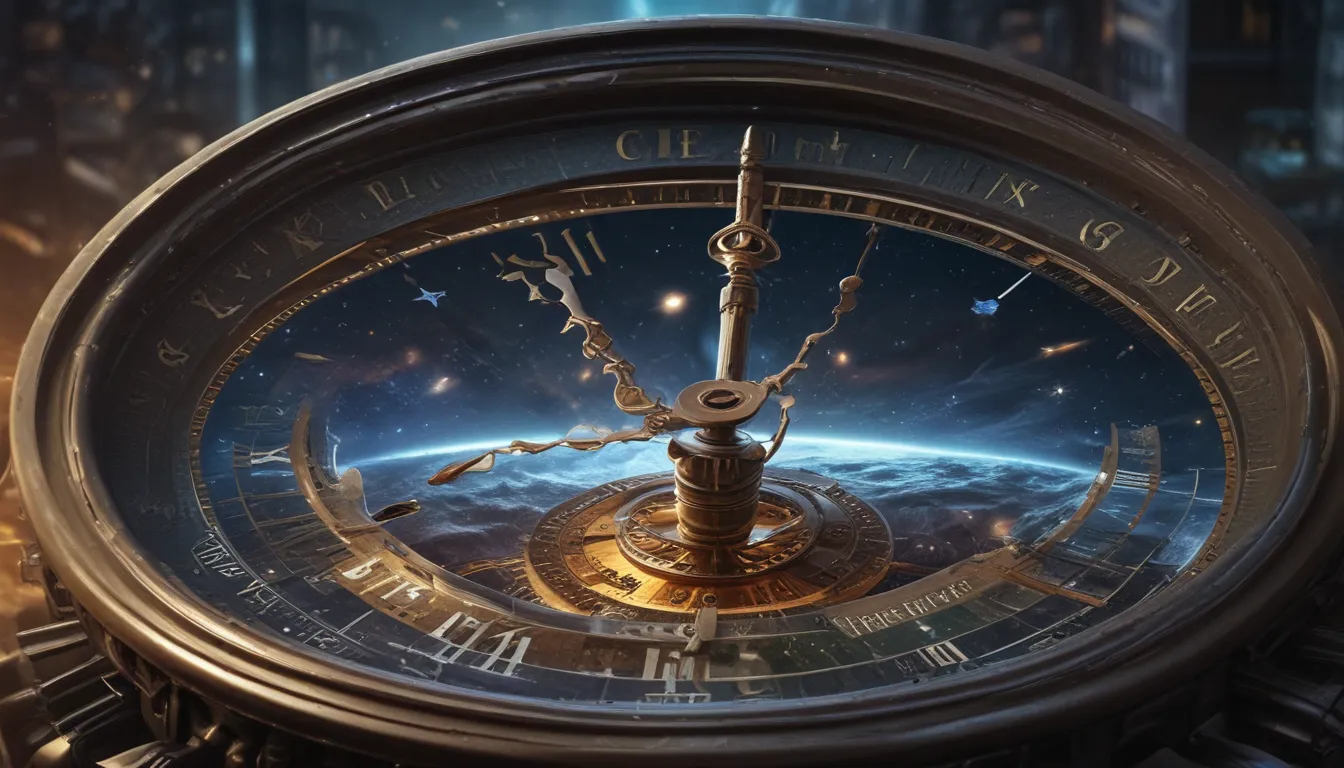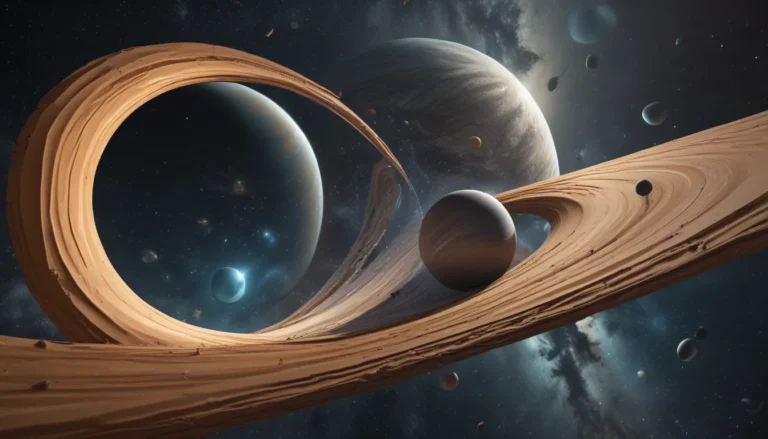A Note About Images: The images used in our articles are for illustration purposes only and may not exactly match the content. They are meant to engage readers, but the text should be relied upon for accurate information.
Time dilation, a concept derived from Einstein’s theory of relativity, is a fascinating phenomenon that challenges our perception of time and its passage. In this article, we will delve into 15 enigmatic facts about time dilation that will leave you captivated and perhaps slightly perplexed. From its implications for space travel to its role in synchronizing clocks across the universe, time dilation opens up a realm of mind-bending possibilities that will spark your curiosity and expand your understanding of the universe.
Unveiling the Concept of Time Dilation
Time dilation, as predicted by Einstein’s theory of relativity, refers to the difference in the passage of time between two observers moving relative to each other. Objects in motion at high speeds or experiencing strong gravitational fields may perceive time to move slower compared to stationary objects. This fundamental concept highlights the interconnected nature of space and time and forms the basis of our exploration into the mysteries of time.
The Reality of Time Dilation: Experimental Verifications
Scientists have conducted numerous experiments to validate the existence of time dilation, showcasing its tangible impact on the passage of time. The Hafele-Keating experiment in 1971, where atomic clocks were flown on airplanes in opposite directions, demonstrated a measurable difference in time compared to stationary clocks. These experiments solidify the reality of time dilation and its profound implications for our understanding of the universe.
Understanding the Mechanisms Behind Time Dilation
Time dilation occurs due to the stretching of space-time, a concept central to Einstein’s theory of relativity. The presence of mass or energy causes a distortion in space-time, known as gravity, which can slow down or stretch time in the vicinity of massive objects. This intricate interplay between gravity and the fabric of space-time sheds light on the mechanisms driving time dilation.
Practical Applications: Time Dilation and GPS Technology
The impact of time dilation extends beyond theoretical concepts, finding practical applications in GPS technology. GPS satellites orbiting the Earth at high speeds and in weaker gravitational fields experience time dilation effects. Without accounting for these effects, GPS signals would be inaccurate, highlighting the crucial role of time dilation in ensuring the accuracy of navigation systems.
Exploring the Multifaceted Nature of Time Dilation
Time dilation manifests not only in gravitational fields but also during motion, showcasing its versatility in different scenarios. From high-speed particle accelerators to space travel, time dilation plays a key role in shaping our understanding of the universe. This phenomenon affects not only time but also other physical quantities, emphasizing the interconnectedness of space and time in the realm of physics.
Implications for Space Exploration: Navigating the Cosmos with Time Dilation
Time dilation becomes a critical factor in space exploration as spacecraft venture into high-speed realms or near massive objects. Factors such as astronaut aging, communication delays, and navigation complexities are influenced by time dilation effects. Understanding and accounting for these phenomena are imperative for the success of interstellar missions and deep space exploration endeavors.
Unlocking the Mysteries of Time: Time Dilation and Aging
As objects experience time dilation, their rate of aging undergoes changes that challenge conventional notions of time. Whether traveling at high speeds or near massive objects, individuals may age differently relative to stationary observers. This profound impact on the aging process highlights the transformative nature of time dilation in shaping our perception of time.
Embracing the Concept of Relativity: Time Dilation and Special Theory
Einstein’s special theory of relativity encompasses the behavior of objects moving at constant speeds in relation to each other. Time dilation serves as a pivotal component of this theory, validated through various experiments and observations. The integration of time dilation into the fabric of relativity deepens our understanding of the interconnected nature of space and time.
Provoking Thought and Imagination: Time Dilation and Time Travel Scenarios
While time travel remains a science fiction trope, time dilation provides a theoretical framework for examining variations in the passage of time. The concept of time dilation has sparked countless thought experiments and captivated the imagination of many individuals. By exploring these scenarios, we gain a deeper appreciation for the intricate relationship between time, space, and the fabric of the universe.
Time Dilation and Its Influence on Synchronizing Clocks Across Vast Distances
The varying rates of time dilation across different gravitational fields or speeds challenge the notion of universal time measurement. Despite these discrepancies, scientists can synchronize clocks and maintain a standard measure of time across vast distances by accounting for the effects of time dilation. This synchronization process underscores the complexity and precision required in understanding the impact of time dilation on our perception of time.
An Enigmatic Phenomenon: Time Dilation and Simultaneity
In the theory of relativity, time dilation affects the perception of events occurring simultaneously for observers in different frames of reference. Depending on relative motion or gravitational fields, what appears simultaneous to one observer may differ for another. This intriguing interplay between time dilation and simultaneity challenges our perception of time and the nature of events in the universe.
Time Dilation Aging: The Impact of Time Dilation on the Human Experience
Time dilation aging emerges as a fascinating consequence of time dilation effects, illustrating how individuals may age differently based on their relative motion or proximity to massive objects. This intriguing phenomenon underscores the dynamic nature of time and its ability to shape our experiences and perceptions of aging. By exploring time dilation aging, we unravel the mysteries of time’s influence on the human timescale.
The Intersection of Time Dilation and Quantum Mechanics: Unanswered Questions and Frontiers
While time dilation has been extensively studied, unanswered questions persist regarding its interactions with quantum mechanics and the potential limits of time dilation. Exploring these frontiers unveils new insights into the nature of time and its fundamental role in shaping the universe. As we navigate the intricacies of time dilation, we encounter profound mysteries that inspire further exploration and discovery in the realm of physics.
Conclusion: Embracing the Wonders of Time Dilation
Time dilation stands as a cornerstone of modern physics, reshaping our understanding of the universe and challenging our perceptions of time. These 15 enigmatic facts about time dilation have illuminated the intricate mechanisms behind this phenomenon, from its experimental verifications to its practical implications for space exploration and technology. By delving into the complexities of time dilation, we embark on a journey of discovery and curiosity that expands our knowledge of the interconnected nature of space and time.
FAQs: Exploring Common Questions About Time Dilation
Q: What is time dilation?
A: Time dilation refers to the phenomenon where time passes at different rates for objects in motion or experiencing different gravitational forces.
Q: How does time dilation occur?
A: Time dilation occurs due to the effects of special relativity and general relativity, influencing the perception of time based on motion and gravitational fields.
Q: Can time dilation be observed?
A: Yes, time dilation has been observed and validated through experiments, showcasing its tangible impact on the passage of time.
Q: Does time dilation only affect time?
A: No, time dilation can influence other physical quantities, such as velocity and momentum, in addition to its effects on time.
Q: Are there practical applications of time dilation?
A: Yes, time dilation finds practical applications in GPS technology, space exploration, and the synchronization of clocks in complex systems.
Q: Can time dilation be reversed?
A: In theory, time dilation can be reversed by manipulating the factors driving its effects, although current technological capabilities limit this possibility.
Q: Does time dilation affect aging?
A: Yes, time dilation can impact aging, leading to variations in the rate of aging based on relative motion or proximity to gravitational fields.
Q: Are there any unanswered questions about time dilation?
A: Yes, ongoing research continues to explore the frontiers of time dilation, uncovering new insights and unanswered questions regarding its nature and limitations.
Time dilation unveils a realm of fascinating possibilities that challenge our understanding of time and its complexities. By exploring the enigmatic world of time dilation, we embark on a journey of discovery and curiosity that stretches the boundaries of our perception of time and space. Join us as we unravel the mysteries of time dilation and delve into the profound secrets of the universe.






